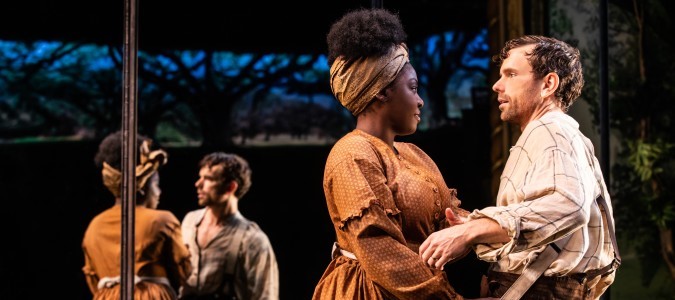

Slave Play
Opening Night: October 6, 2019
Closing: January 5, 2020
Theater: Golden Theatre
It stunned audiences with a sold-out run at New York Theatre Workshop. Now, Slave Play is coming to Broadway. Written by Jeremy O. Harris, “one of the most promising playwrights of his generation” (Vogue), this “dazzling mix of satire and psychodrama” (The New York Times) is directed by two-time NAACP and Obie Award® winner Robert O’Hara. At the MacGregor Plantation, nothing is as it seems, and yet everything is as it seems. It’s an antebellum fever-dream as three interracial couples converge to rip open history at the intersection of race, love, sex, and sexuality in 21st-century America. Don’t miss this “furiously entertaining…altogether staggering new play.” (The New York Times)
BUY TICKETSREAD THE REVIEWS:
October 6, 2019
Jeremy O. Harris’ broad send-up of race and sex in America, “Slave Play,” isn’t outrageously funny. But it does have its funny moments — and it certainly is outrageous. In the very first scenes, we’re confronted with three vignettes of seduction and copulation. For starters, a slave named Kaneisha (the abundantly talented Joaquina Kalukango) enthusiastically seduces Massa Jim (Paul Alexander Nolan), who prefers to be called Mista Jim, by throwing herself on the cabin floor and twerking.
READ THE REVIEWOctober 6, 2019
Though it’s mild, paradoxical and perhaps a bit prurient to say so, “Slave Play” is a happy surprise. It’s mild because Jeremy O. Harris’s play, which opened at the Golden Theater on Sunday, is one of the best and most provocative new works to show up on Broadway in years. It’s a paradox because what could be happy in a play about pain? A play so serious, so furious and so deeply engaged in the most intractable conflicts of American life that it became both a cause célèbre and a scandal before it opened?
READ THE REVIEWOctober 6, 2019
One’s insecurities about race are taxed to the max in a visit to “Slave Play,” Jeremy O. Harris’s fascinating, improvised-explosive-device of a play that had its official opening Sunday at Broadway’s Golden Theatre. I say this as a white person absorbing Harris’s scathing observations about how white people really don’t hear black people — or how they never allow black people to work out in their presence the magnitude of their traumas, even in the most intimate of relationships. Harris’s funny and profane seriocomedy compels you to a clearer understanding of this eternal dynamic, as he forces you to consider the identity niche of your own view of your fellow humans, particularly across racial lines.
READ THE REVIEWOctober 6, 2019
One of the first hints – an uneasy moment in a remarkable evening full of them – planted in Jeremy O. Harris’ Slave Play suggesting that all is not as it seems (and even what it seems isn’t entirely clear) comes shortly into the opening scenario. A black woman, dressed in Antebellum slave garb, and a white man, attired in the sort of short-hand plantation overseer costume we know from Roots and any number of similar period dramas, are in the midst of an encounter queasy with sexual overtones. No, not sexual. Rape overtones – the leering, bullwhip-toting man is using every bit of his inherent power to forecast what’s coming. The woman’s exaggerated patois – she pointedly says “massa,” not “master” – is loaded with a comic, fearful exaggeration that wouldn’t be out of keeping in an old Stepin Fetchit routine.
READ THE REVIEWOctober 6, 2019
Playwright provocateur Jeremy O. Harris brings a black, queer, blazingly transgressive voice to Broadway with Slave Play, and much of the advance hype around the uptown transfer of this New York Theatre Workshop sensation has trumpeted those qualities as an imperative for mainstream audiences to “be part of the cultural conversation.” That eye-rolling marketing blather from producers risks making it seem a manufactured hashtag hit, designed to seduce woke Manhattanites hungry for the new and the now. But this is a ballsy, often ferociously funny original work that deserves to be seen on its own merits.
READ THE REVIEW























